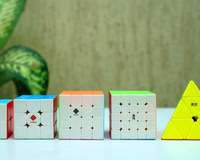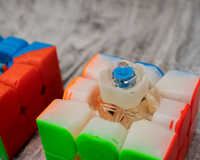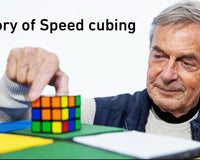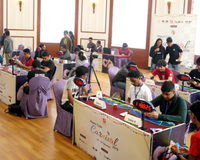Hi, I’m Kunal Oak, a three-time 7x7 National Record Holder, defending 7x7 National Champion and a speedcubing coach. In this blog, I will be offering advice on how to control your nerves at a competition, a skill which has led me to win several competitions by defeating people even faster than me.
Why do we get nervous?
The issue I see a lot of people face is that they attribute their nerves in official competitions to only one external factor. The truth is, we get nervous because of some combination of these factors, such as solving in an unfamiliar environment, cold hands, the competitive element, knowing every solve counts and many more. It's important to recognise these, so that we can fix these in isolation in hopes of improving our control over nerves.
Unfamiliar environment
The best piece of advice to offer for controlling your nerves is to practice in a competition-style environment. This doesn't just mean practicing with a stackmat - I'm talking about having a gap between each solve, having timed inspection, practicing with a cube cover and doing only an ao5 at a time (mo3 for big cubes, of course). Essentially, the more variables from an actual competition you can replicate, the less "alien" you will feel during official solves.

I used to be one of the people who practiced solely on keyboard. Why? Because it was easy. I just booted my laptop, opened up CS Cube Timer and grinded out long sessions. It's only after close to a year of competing that I realised keyboard was too "comfortable"- that's when I started doing compsims (i.e. competitions simulations) as described above, and it helped me immensely.
Cold hands
This might seem a trivial thing, but you'd be surprised how often cubers complain about having cold hands all year round, not just in winters. And it's no surprise, cold hands inhibit your ability to turn the cube properly, leading to a lot of fumbling.
Some of my best official results have been during winters - that is because I have been fortunate enough to have fairly warm hands all year. But if you're someone who gets cold hands, the simple solution is to be prepared - bring a packet of disposable hand warmers with you to the venue (you can use electric warmers too but in my experience, they take forever to charge and aren't as effective).
The only solves that matter
This is easily the biggest psychological hurdle to cross and it's what separates good solvers from elites. There's a reason a lot of people have been capable of 3x3 WR average for years but only one person has dominantly held it until recently. It's also the reason that very often the person who wins the competition isn't necessarily the fastest - they just managed to keep their composure when it mattered. We spend weeks (sometimes months) practicing for a competition where we only get five solves at a time - it's easy to get in your own head.

Overcoming this is a very personal matter and it won't be the same for everyone. Truth be told, the faster and more competitive I've gotten, the more I've had to consciously take care of this - because believe me, breaking your PB seems much easier than being on the verge of a national record, and I missed 7x7 NRs twice as well as 6x6 NR mean once by less than a second each time just because of this, before I finally got both 7x7 records.
For me, what did the trick was being so far ahead of NR that it was no longer a concern for me, which is how I ended up beating the mean by 11 whole seconds. However, obviously as people get faster and we start to reach our limits, this isn't a feasible approach.
I think a good starting point for people suffering from this is meditative breathing - it's a trick I learned from Jayden McNeill, who won Square-1 at World's 2017. I would recommend looking this up in depth, but put briefly, try inhaling and exhaling slowly, while focusing your entire thought towards the breath. Pinpoint where you hit the apex of your inhale and the end of your exhale and if at any point you catch yourself thinking about absolutely anything other than your breath, simply bring your attention back to your breath.
Doing this simple exercise about 10-15 minutes per day will help you focus a lot, as it will get you into the habit of not focusing on thoughts that make you nervous. Do the same breathing before every official solve, and it will help clear your head for the most part.
Experience
It goes without saying that amongst other things, controlling your nerves will also get better with time. As I mentioned, the closer you get to breaking a record, the more it can add to your nerves - however, you will proportionately get much better at controlling your nerves as well. Here you can read my cubing journey and I used to control my mind during competition. My general advice is, if you're practicing for the sake of improving your times, have an "off-season" where you choose to stay at home and grind for big competitions, whereas if you're already record-worthy and going for an official record, competing more frequently will not just help you control your nerves, but gives you way more rounds. Often what helps people keep their composure is knowing that they have more rounds to go - hence, they feel like they have a safety net and aren't afraid to go all out.
































